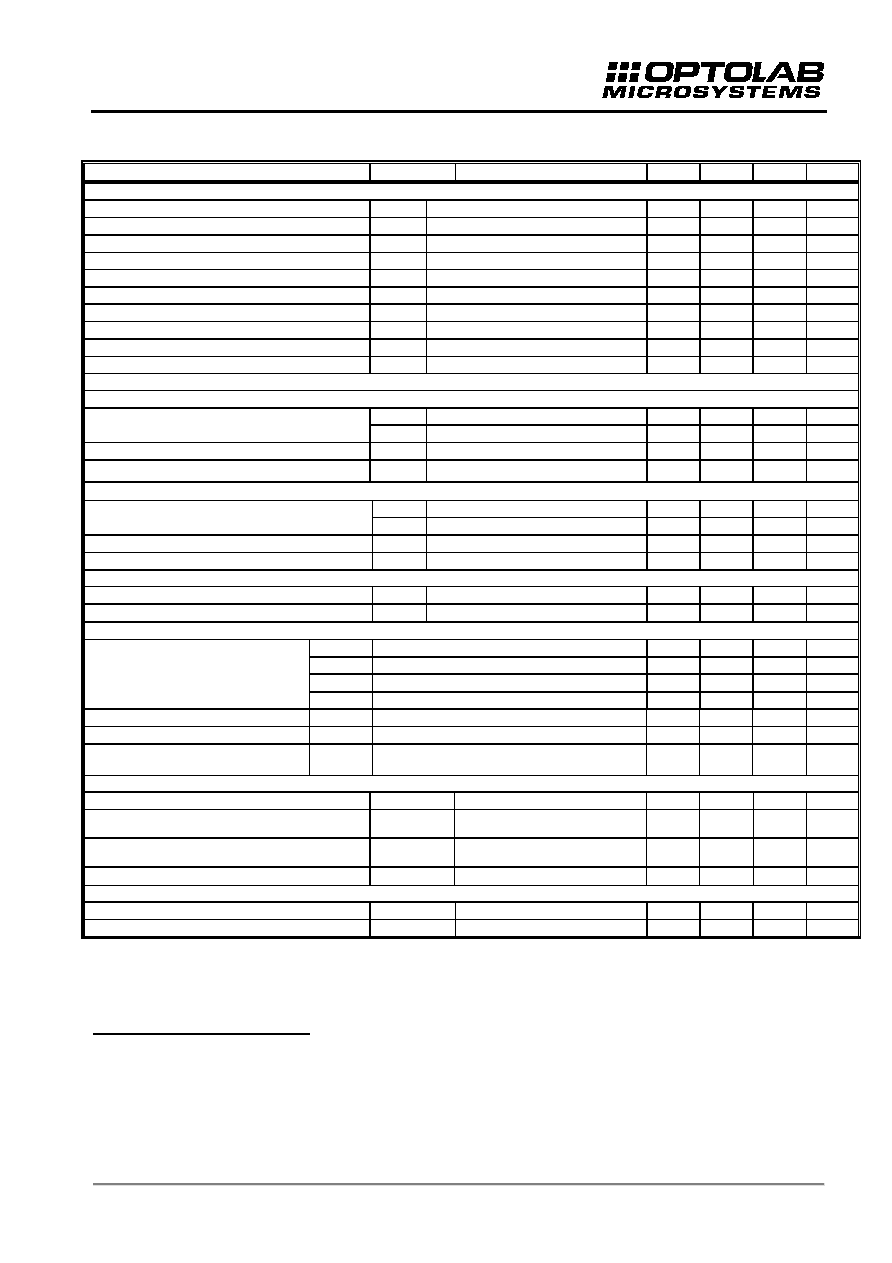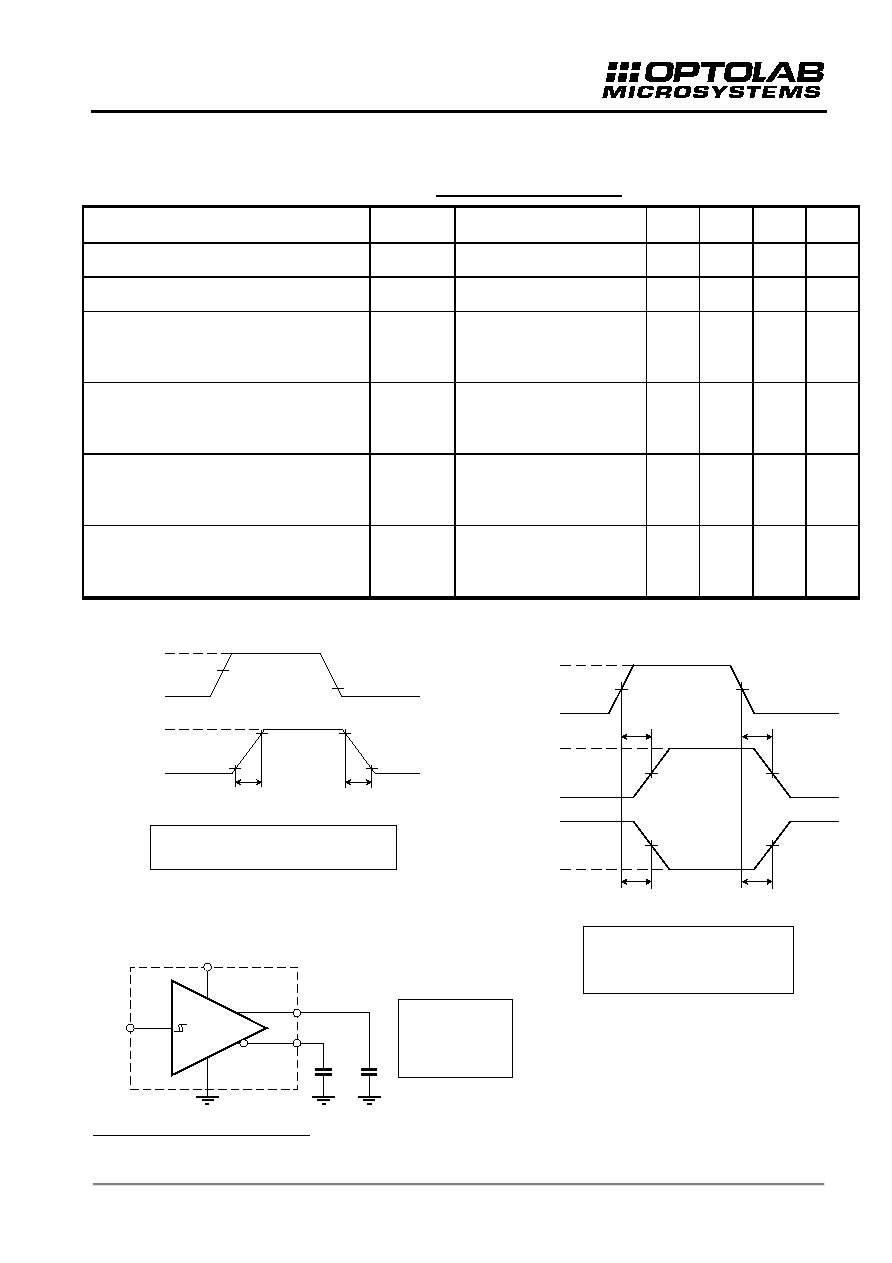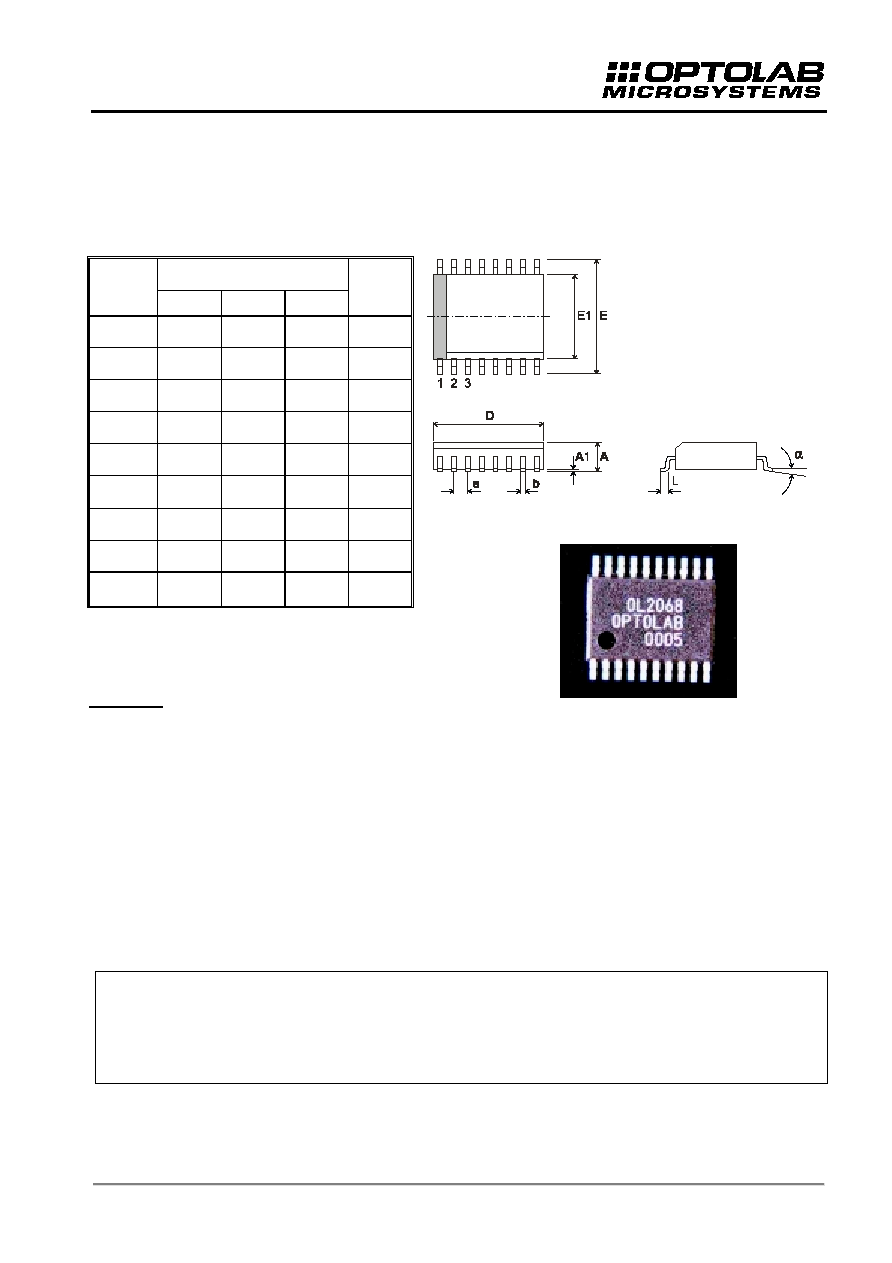 | –≠–ª–µ–∫—Ç—Ä–æ–Ω–Ω—ã–π –∫–æ–º–ø–æ–Ω–µ–Ω—Ç: OL2068 | –°–∫–∞—á–∞—Ç—å:  PDF PDF  ZIP ZIP |

OL2068
Industrial 30 Volt 4-Channel Differential Power Line Driver - Short Circuit Proof -
OPTOLAB Microsystems GmbH * Haarbergstr. 61 * 99097 Erfurt / Germany * Tel. +49-361-422906-0 * Fax +49-361-422906-50 *
www.optolab.com
Datasheet Version 1.04 Aug.29.2000
Features
∑
Ultra small package TSSOP 20
∑
Max. voltage range from 4,5 V ≠ 36 V
∑
Short circuit proof tri-state outputs drive
up to 120mA sink / source
∑
Operating frequency up to 4 MHz
∑
Integrated voltage reg. with 5V output
∑
Dynamic peak current up to 1,5 Amp.
∑
High impedance CMOS / TTL compatible
buffered inputs with hysteresis
∑
Outputs RS422A compatible
Applications
∑
Industrial encoder interfacing
∑
Industrial sensor interfacing
∑
Proximity switches
∑
Industrial controllers
∑
Light barriers
Voltage regulator
CMOS / TTL
Data input
CMOS / TTL
Data input
CMOS / TTL
Data input
CMOS / TTL
Data input
Differential
Output A
Output A -
Differential
Output B
Output B -
Differential
Output C
Output C -
Differential
Output D
Output D -
Protection logic controller
- short circuit shut down
- Tristate and thermal logic control
- undervoltage and power up reset
- Transient and EMI protection
5V , 5mA out
Line voltage in
Tristate enable / disable
Thermal shutdown disable
Error signal out
General Description
The OL2068 is an industrial
power line driver and contains
four identical short circuit proof
differential line drivers up to 30
Volts driver supply with a joint
enable function. An internal 5 V
power supply is used as
reference and supply voltage for
the circuitry and is able to supply
max. 5mA for external 5V
components like a sensor or a
constant current source for a
LED.
The very small outline TSSOP
package gives excellent thermal
power dissipation, thus the usage
in space limited applications is
easy.
Ultra small package TSSOP 20

OL2068
Industrial 30 Volt 4-Channel Differential Power Line Driver - short circuit proof -
OPTOLAB Microsystems GmbH * Haarbergstr. 61 * 99097 Erfurt / Germany * Tel. +49-361-422906-0 * Fax +49-361-422906-50 * www.optolab.com
2/9
Electrical characteristics
All voltage values are referenced to GND (GND = 0V).
Unless stated otherwise all signals are assumed to be high active.
Table 1 Absolute Maximum Ratings
Parameter Symbol
Condition
Min
Max
Unit
DC supply voltage
V
CCD
-0.3
36.0
V
DC input voltage
V
IN
-0.3
V
CC
+ 0.3
V
DC input current
I
IN
±
10
mA
Output voltage
V
OUT
-0.3
V
CC
+ 0.3
V
Driver output current
(see cable model)
I
OUT
pulse peak/average
1500/100
mA
Storage and operating temperature range
T
STGOP
-55
+125
∞C
Junction temperature
T
J
+150
1
∞C
Lead temperature
T
L
soldering, 10s
+260
2
∞C
Power dissipation:
OL7272
SOIC16NB: R
th j-a
= 111.8 K/W
OL2068
TSSOP20: R
th j-a
= 81.4 K/W
PD
still air,
T
A
= 85 ∞C,
T
J
= 150 ∞C
581
798
mW
mW
Table 2 Recommended Operating Conditions
Parameter Symbol
Condition
Min
Max
Unit
DC supply voltage
V
CCD
4.5
30.0
V
DC data input voltage
V
IN
D
0
V
CCD
V
DC enable input voltage
V
IN
EN
3
0
5.5
V
Data output voltage
V
OUT
D
0
V
CCD
V
TMON output voltage
V
OUT
TM
0
V
CCI
V
Driver output current
(see cable model)
I
OUT
4
100
mA
Operating ambient temperature range
T
A
5
-40
+100
∫C
Junction temperature range (lifetime)
T
J
-55
+125
∫C
NOTE:
Stresses above those listed under "Absolute Maximum Ratings" may cause permanent damage to the device.
This is a stress rating only and functional operation of the device at these or any other conditions above those indicated in
the operational section of this specification is not implied. Exposure to absolute maximum rating conditions for extended
periods may affect device reliability (eq. hot carrier degradation).
1
Look at over-temperature protection Table 3
2
For surface mounting plastic packages.
3
Valid for normal function. To disable automatic thermal shutdown, this pin should be set to 7,5 ≠ 12 Volt.
4
Limited by power dissipation.
5
Driving capability at elevated temperatures will be limited by total package power dissipation
. Special packages up to 125∞C can be supplied

OL2068
Industrial 30 Volt 4-Channel Differential Power Line Driver - short circuit proof -
OPTOLAB Microsystems GmbH * Haarbergstr. 61 * 99097 Erfurt / Germany * Tel. +49-361-422906-0 * Fax +49-361-422906-50 * www.optolab.com
3/9
Table 3 DC Characteristics (V
CCD
= 12.0 V, T
A
= 25 ∞C, unless otherwise noted)
Parameter Symbol
Condition
Min
Typ
Max
Unit
Schmitt trigger inputs section
Data input hysteresis
V
HYS
D
V
IL
to V
IH
and V
IH
to V
IL,
ENABLE
0.8 V
0.2 0.5 V
Data input positive going threshold
V
TH+
D
ENABLE
0.8 V
1.7
2.4
V
Data input negative going threshold
V
TH-
D
ENABLE
0.8 V
0.8 1.2 V
Enable input hysteresis
V
HYS
EN
V
IL
to V
IH
and V
IH
to V
IL,
0.2 0.5 V
Enable input pos. going threshold
V
TH+
EN
1.7
2.4
V
Enable input neg. going threshold
V
TH-
EN
0.8
1.2
V
Data input leakage current - Low
I
IL
D
ENABLE
0.8 V
-10.0 +10.0
µA
High
I
IH
D
ENABLE
0.8 V
-10.0 +10.0
µA
Enable input leakage current - Low
I
IL
EN
-10.0
+10.0
µA
High
I
IH
EN
-10.0
+10.0
µA
Push-pull output drive section
- Low side switch outputs
6
V
OLB
V
CCD
= 4.75 V, I
LOAD
= 20mA ENABLE
0.8 V
0.3
0.5 V
Low level output voltage
V
OLT
V
CCD
= 30 V, I
LOAD
= 30mA, ENABLE
0.8 V
0.4
0.5 V
Output resistance
R
DSON
7
I
LOAD
= 30 mA
13
20
High-impedance output leakage current
I
OZ
V
CCD
= 30.0 V, ENABLE
2.4 V
-10.0 +10.0
µA
- High side switch outputs
6
V
OHB
V
CCD
= 4.75 V, I
LOAD
= -20 mA,ENABLE
0.8V
4.2
V
CCD -
0.4
V
High level output voltage
V
OHT
V
CCD
= 30V,I
LOAD
= -30mA, ENABLE
0.8 V
29.2
V
CCD -
0.6
V
Output resistance
R
DSON
7
I
LOAD
= -30mA
20
30
High-impedance output leakage current
I
OZ
V
CCD
= 30.0 V, ENABLE
2.4 V
-10.0 +10.0
µA
- MON output
8
Low level output voltage
V
OL
I
LOAD
= 2.0 mA
0.4
V
High level output voltage
V
OH
I
LOAD
= -2.0 mA
V
CCI
-0.8
V
Supply parameters section
I
DB
(en)
V
CCD
= 5.0 V, ENABLE
0.8 V
1.5
5.0
mA
I
DT
(en)
V
CCD
= 30.0 V, ENABLE
0.8 V
1.5
5.0
mA
I
DB
(dis)
V
CCD
= 5.0 V, ENABLE
2.4 V
1.5
3.0
mA
V
CCD
supply current
9
I
DT
(dis)
V
CCD
= 30.0 V, ENABLE
2.4 V
1.5
3.0
mA
Internal supply voltage
10
V
CCI
11
I
CCIE
= 5.0 mA
4.5
5.0
5.5
V
Quiescent current
I
CCQ
12
V
IN
= 2.4 V or 0.8 V
0.2
mA
Current from internal voltage
regulator to supply external devices I
CCIE
13
5.0
mA
Low voltage reset section
Hysteresis for under-voltage reset
V
HYS
LVR
0.1
V
Under-voltage reset negative going threshold
(active)
V
TH
-LVR
3.3
3.5
3.7
V
Under-voltage reset positive going threshold
(inactive)
V
TH+
LVR
3.4
3.6
3.8
V
Under-voltage reset filter time
t
FIL
LVR
14
5 µs
Over-temperature protection section
Over-temp. operate point (junction)
T
JOP
+165
+185
∞
C
Over-temp. release point (junction)
T
JRP
+125
+135
∞
C
6
Either the low or high side switch is active at a time.
7
Values will not be part of the production test but guaranteed by design.
8
Output MON external driving current up to 4 mA possible ≠ but using this limits the thermal power budget !
9
Measured without external load on V
CCI
pin, all outputs open.
10
For decoupling V
CCI
please connect this output with a 100nf capacitor to GND
11
Depends on supply voltage V
CCD
, V
CCI
could be not higher than V
CC
- 0.3 V.
12
This is measured per input with all other inputs held at V
CCI
or GND.
13
Limited by power dissipation, high I
CCI
current with growing V
CCD
voltage generates heat, thus the driving limit can be reached earlier
14
Value will not be part of the production test but guaranteed by design.

OL2068
Industrial 30 Volt 4-Channel Differential Power Line Driver - short circuit proof -
OPTOLAB Microsystems GmbH * Haarbergstr. 61 * 99097 Erfurt / Germany * Tel. +49-361-422906-0 * Fax +49-361-422906-50 * www.optolab.com
4/9
Table 4 AC Characteristics (V
CCD
= 12.0 V, T
A
= 25 ∞C,
Cable capacitance 1000pF
, unless otherwise noted)
Parameter Symbol
Condition
Min
Typ
Max
Unit
Disable delay time
t
OFF
100
200.0
ns
Enable delay time
t
ON
76
600.0
ns
Propagation delay from 50% point of rising
edge of input pulse to zero crossing of
differential outputs (see Figure 1)
t
PLH
V
CCD
= 5.0 V
V
CCD
= 12.0 V
V
CCD
= 24.0 V
C
LOAD
= 1000 pF
64
74
100
200.0
200.0
330.0
ns
ns
ns
Propagation delay from 50% point of falling
edge of input pulse to zero crossing of
differential outputs (see Figure 1)
t
PHL
V
CCD
= 5.0 V
V
CCD
= 12.0 V
V
CCD
= 24.0 V C
LOAD
= 1000 pF
70
80
100
280.0
280.0
330.0
ns
ns
ns
Output rise time (see Figure 2)
t
R
15
V
CCD
= 5.0 V
V
CCD
= 12.0 V
V
CCD
= 24.0 V C
LOAD
= 1000 pF
42
110
120
200.0
350.0
380.0
ns
ns
ns
Output fall time (see Figure 2)
t
F
16
V
CCD
= 5.0 V
V
CCD
= 12.0 V
V
CCD
= 24.0 V C
LOAD
= 1000 pF
32
62
84
200.0
350.0
380.0
ns
ns
ns
15
Measured from 10% to 90% of the Output signal with a capacitive load on each output pin to ground (see Figure 3).
50%
50%
50%
50%
V
OL
V
OH
Input
Output
Output-
t
PLH
t
PHL
t
PHL
50%
50%
V
IH
V
IL
t
PLH
V
OL
V
OH
V
OL
V
OH
Input
Output
V
TH+
V
IH
V
IL
V
TH-
90%
10%
10%
90%
t
R
t
F
Figure 1
Timing diagram with typical
asynchronous propagation delays
Figure 2
Definition of Output Rise and Fall Time
V
CCD
Output+
Output-
1/4
OL2068
Input
C
L
C
L
Figure 3
AC Test Circuit
C
L
= 1.000pF

OL2068
Industrial 30 Volt 4-Channel Differential Power Line Driver - short circuit proof -
OPTOLAB Microsystems GmbH * Haarbergstr. 61 * 99097 Erfurt / Germany * Tel. +49-361-422906-0 * Fax +49-361-422906-50 * www.optolab.com
5/9
Form of delivery and order code:
TSSOP20
Antistatic tubes containing 70pcs order part no. OL2068
Tape & Reel part no. OL2068 TR
High thermal power dissipation by integrated heatlink append "HL" to part number.
A demoboard with 2 line drivers plus connectors and status LEDs is available with order code
OL2068 Demo
Mechanical characteristics
Package Dimensions
TSSOP20 (173 mil)
Symbol
Min Typ Max
Unit
D 6.40(0,25) - 6.60(0,26)
mm(inch)
E1 4.30(0,17) - 4.50(0,18)
mm(inch)
E -
6.40(0,25)
-
mm(inch)
A - -
1.20(47)
mm(mils)
A1 0.05(2) - 0.15(6)
mm(mils)
b 0.19(7) - 0.30(11)
mm(mils)
e -
0.65(26)
-
mm(mils)
L 0.50(20) - 0.75(30)
mm(mils)
- 8 -
∞
Notes:
For hybrid applications this driver is also available as chip. Please contact us for further details.
For space critical applications custom design packages, i.e. with 2 or more driver chips in one package, can
be designed at customer request. Please email OPTOLAB at sales@Optolab.com




